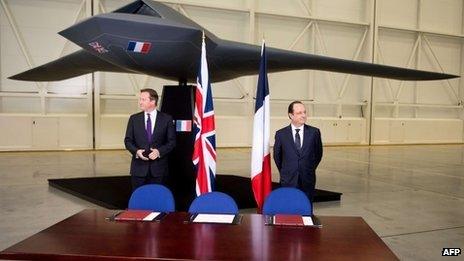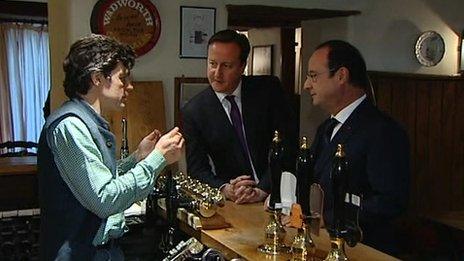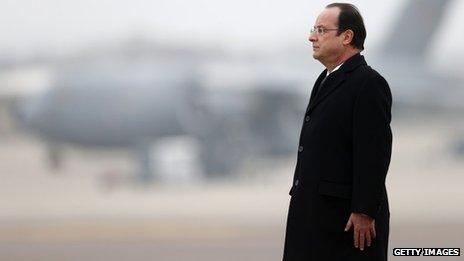Cameron and Hollande differ over reforms to EU
- Published
- comments
Francois Hollande: "Amendments to the treaties are not urgent"
French President Francois Hollande has said the European Union cannot be expected to "follow the example" of one country after talks with David Cameron.
He described Mr Cameron's demands for EU treaty changes by 2017, as a prelude to a referendum on the UK's membership, as "not a priority for the time being".
But Mr Cameron said he was committed to changing the UK's links with the EU.
Mr Hollande also declined to answer a question about his private life at a press conference at RAF Brize Norton.
He recently split from his partner Valerie Trierweiller amid reports he had an affair with another woman.
Mr Cameron's Conservative Party is promising to hold an in-out referendum on the European Union by the end of 2017 if it wins the 2015 general election.
The Conservatives say a fundamental re-negotiation of the UK's membership, which would see more powers over immigration, welfare and justice return to the UK, would necessitate changes to existing EU treaties.
Speaking during a UK-France summit, Mr Hollande said the UK was entitled to hold a referendum about its place in Europe and he hoped the UK would remain a member of a more "efficient" union.
But he said the need for treaty changes, requiring the approval of other member states, were not "urgent" and the focus must be on Europe's economic challenges.
"We feel revising the treaties is not a priority for the time being," he said. "We can't expect to follow the example of one country in Europe to determine the rest."
But Mr Cameron said Europe must become more "competitive" and "better address" public concerns.
"We want to see those changes," he said. "We want to see that re-negotiation and that re-negotiation will involve elements of treaty change."

The two leaders celebrated the countries' defence links

After the talks, the two men moved onto the Swan Inn in Swinbrook for a pub lunch
He added: "What people really need to know is that the in-out referendum will happen by the end of 2017. There is no doubt about that."
But the prime minister suffered a setback after proposed legislation that would have enshrined the referendum pledge into law was killed off in the Lords - amid opposition from Labour, Lib Dem and crossbench peers.

The French president has been criticised for his economic policies
Labour said Mr Hollande's remarks were further proof Mr Cameron's European agenda was "fraying at the seams".
"Europe does need to change, but the UK's partners are already ruling out treaty change on the arbitrary timetable that David Cameron has set out," its Europe spokesman Gareth Thomas said.
During two hours of talks, the two leaders also reached agreements on defence, energy and science and then moved onto a working lunch in a local pub, The Swan Inn at Swinbrook.
'Uncertainty'
The summit follows criticism by both the UK and French governments over the state of the other's economies, with some Conservatives contrasting the stronger growth and falling unemployment in the UK with the sluggish recovery in France and blaming Mr Hollande for pushing up tax rates.
Mr Cameron praised the French president's recent announcement of cuts to business taxes and employer regulations.
In response, Mr Hollande said the two government's economic policies were "not exactly the same" but were focused on the same objectives, to boost growth and employment.
On defence, Mr Cameron said their relationship was as "close and important" as ever and, by working together, the two countries could ensure their defence budgets "go further" and have more of a "global impact".
Mr Hollande said co-operation was "very strong", highlighting joint military and diplomatic efforts in Libya and the Central African Republic and efforts to tackle the radicalisation of British and French citizens fighting in Syria.
Defence deals signed on Friday include a £120m feasibility study for a new armed drone, the Future Air Combat System, and a £500m joint purchase of anti-ship missiles
It was also announced that the UK will receive two A400M transport planes earlier than expected after swapping a delivery slot for the aircraft with the French.
A joint memorandum of understanding on nuclear power was also agreed, involving small and medium-sized firms in the nuclear supply chain and co-operation between researchers on both sides of the Channel.
- Published31 January 2014
- Published31 January 2014
- Published31 January 2014
- Published31 January 2014
- Published15 January 2014
- Published27 January 2014